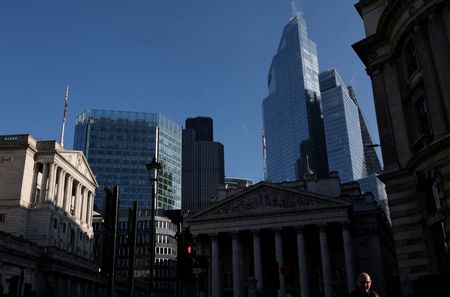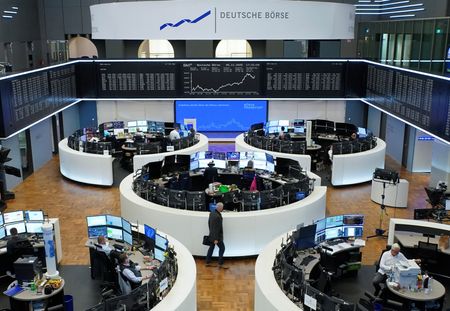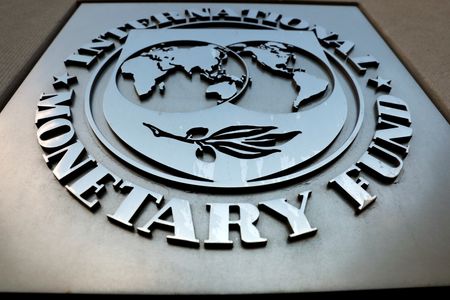By Caroline Valetkevitch and Marc Jones
NEW YORK/LONDON (Reuters) -Major stock indexes fell sharply on Thursday, with technology and consumer discretionary shares leading losses in the S&P 500, while the British pound firmed after the Bank of England opted against an interest rate cut.
Shares of U.S. chipmaker Qualcomm dropped more than 4% after warning that its chips might not be as dominant as before in future Samsung gadgets.
Shares of Legrand plunged after the French data-center equipment firm reported sales growth of 11.9% in the first nine months of the year, slightly below expectations, hit by U.S. tariffs.
Sterling was last up 0.37% at $1.3097. Ahead of likely tax hikes in UK Chancellor Rachel Reeves’ budget later this month, the BoE Monetary Policy Committee voted 5-4 to keep the central bank’s benchmark Bank Rate at 4.0%. The close vote kept expectations of a cut before year-end intact.
On Wall Street, investors remain focused on stretched valuations, the U.S. government shutdown, trade tariff legal rulings, and the ongoing slew of corporate earnings.
“This earnings season is not defined in the rearview mirror. The market wants guidance and right now, with tariffs, the shutdown and possibly peak AI (artificial intelligence), the future could be bleak,” said Jake Dollarhide, chief executive officer of Longbow Asset Management in Tulsa, Oklahoma.
Earlier this week, some U.S. bank chief executives warned about a likely market pullback.
Investors digested a report by Challenger, Gray & Christmas that showed U.S.-based employers cut more than 150,000 jobs in October, marking the month’s biggest reduction in more than 20 years.
Economic data from private sources has drawn increased investor interest amid the absence of official data during the U.S. government’s longest-ever shutdown.
The Dow Jones Industrial Average fell 373.08 points, or 0.79%, to 46,937.92, the S&P 500 slid 63.56 points, or 0.94%, to 6,732.73 and the Nasdaq Composite dropped 363.84 points, or 1.56%, to 23,135.95.
MSCI’s gauge of stocks across the globe fell 4.87 points, or 0.49%, to 993.02.
The pan-European STOXX 600 index fell 0.73%.
Overnight, Japan’s Nikkei rebounded 1.4% after sliding 2.5% on Wednesday. In China, Shanghai’s benchmark stock index reclaimed the psychologically important 4,000 level, as optimism over tech self-sufficiency boosted its semiconductor and AI-related shares.
The dollar fell after the weak U.S. labor data increased market expectations of another Federal Reserve rate cut this year.
The dollar index, which measures the greenback against a basket of currencies including the yen and the euro, fell 0.28% to 99.85, with the euro up 0.36% at $1.1532. Against the yen, the dollar weakened 0.64% to 153.12.
In bond markets, euro zone benchmark Bund yields dropped from their four-week high after the BoE decision. Germany’s 10-year yields were down 2 basis points (bps) at 2.65% after hitting 2.676% early in the session, the highest level since October 10.
U.S. Treasury yields fell, with investors concerned about the labor market and uncertainty from the U.S. government shutdown.
The benchmark U.S. 10-year note yield fell 6.4 basis points to 4.093%, from 4.157% late on Wednesday.
U.S. crude slid 0.69% to $59.18 a barrel and Brent fell to $63.19 per barrel, down 0.52% on the day.
(Additional reporting by Rae Wee in Singapore; Editing by Richard ChangEditing by Philippa Fletcher, Peter Graff and Richard Chang)












